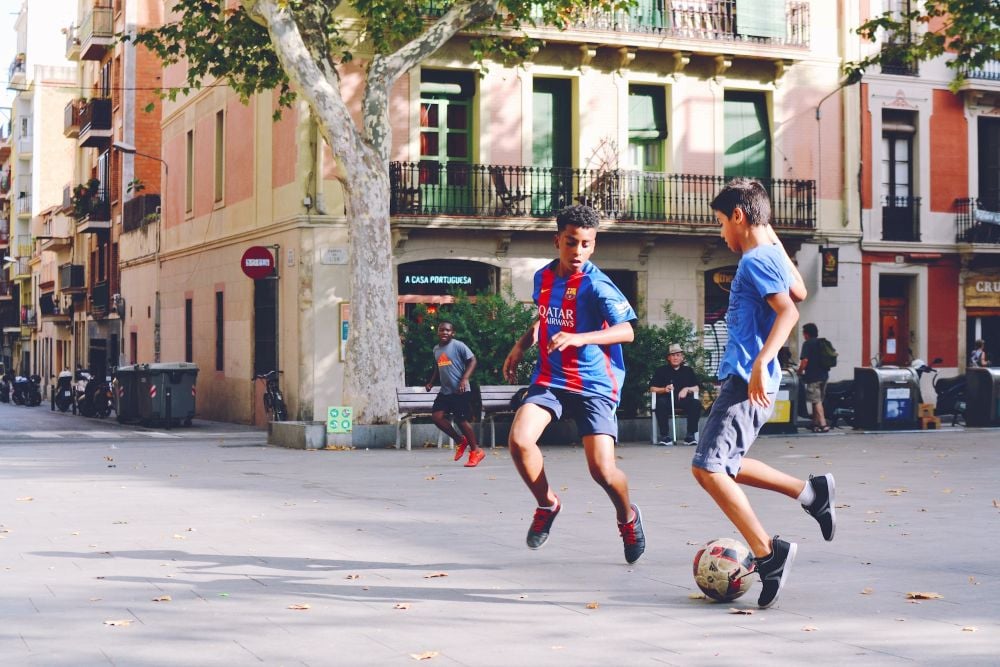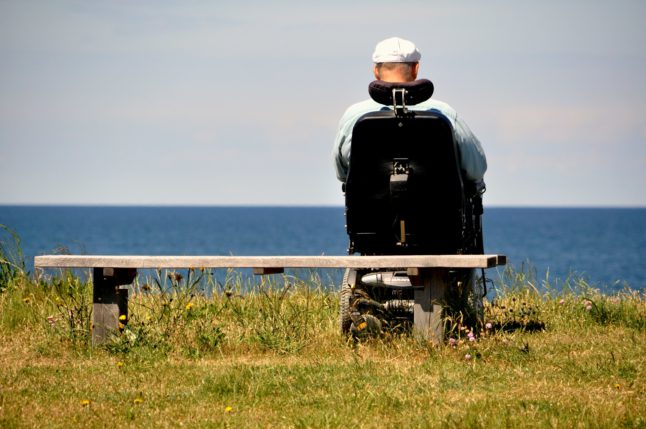Spanish cuisine and weather is so good and so famous, that you needn’t live in Spain to be aware of it.
The laid-back lifestyle and slower pace of life are also very well known, as are cultural norms like eating lunch and dinner later in the day and kissing on the cheek when greeting each other.
Other classic stereotypes include the siesta and slow bureaucracy, as well as the infamous Spanish punctuality (or lack thereof), but Spanish culture is also home to a number of habits and general cultural quirks you might not be aware of, unless you live here.
As Spaniards often say, ‘España es diferente‘ (Spain is different), although for them this often has a negative connotation.
The Spanish way of queuing
For the neurotic Brits among us, you’ve probably noticed that the Spanish concept of queuing is a little different, to say the least. Whereas orderly queuing and waiting your turn seems to be embedded into British DNA, in Spain it’s not uncommon to see couples or families queuing at different counters to buy tickets or tills at the supermarket to see which is the quickest, then joining up together when the first one gets their turn.
You may also notice that if someone meets a friend or someone they know in the queue, they will often push in, to queue with them, and occasionally an abuelo or abuela (grandfather or grandmother) will sneakily jump the queue because they can get away with it.
It’s much more common for someone to simply call out “¿Quien va el último?”, translated as “Who is the last?”. They will then know that it’s their turn after whoever answers them.
READ ALSO: Are Spaniards really that bad at queuing?
Pensioners watching construction work
For some reason, many Spaniards seem fascinated by construction work and can often be seen standing around observing las obras (building or construction work).
We aren’t entirely sure why this is, or if it’s even a particularly Spanish phenomenon. Anecdotally at least, it seems to be something that foreigners notice in Spain, and it’s often groups of older men who seem to be doing it.
Being retired with lots of free time, plus the Spanish tendency to spend more time out and about in the street (a perk of Spanish weather and its pedestrian-friendly public infrastructure) might be one of the reasons.
Not eating or drinking on the go
We know that Spaniards enjoy their time on the terrazas of cafés that often line the streets. However, it’s very rare to see people eating on the move. In the UK and the US for example, it’s very common to see people scoffing down a bite to eat while walking around.
In Spain, this isn’t common at all. It boils down to how different Spain’s relationship with food is – something worthy of an entire article in itself.
Likewise, seeing people walking around with takeaway coffee is also pretty rare in Spain. Though you do sometimes see it in bigger cities like Barcelona and Madrid, generally speaking in Spain if you’re going to have a coffee you sit down and have it in a cafetería or on their outdoor terrace, if you want to be really Spanish about it.

Letting their dogs poo everywhere
Speaking of walking down the street, it’s probably for the best that Spaniards don’t eat while on the move because if they did they’d probably step in dog poo.
Many foreigners in Spain notice that seems to be an endless amount of dog mess in the Spanish streets.
According to the country’s National Institute of Statistics (INE), 40 percent of Spanish households have a dog. In fact, believe it or not, the Spanish have more dogs than they do children – while there are a little over six million children under the age of 14 in Spain, there are over seven million registered dogs in the country.
Another contextual factor worth considering when understanding the quantity of caca (poo) in Spain’s streets is how the Spaniards themselves actually live. When you remember that Spaniards mostly live in apartments without their own gardens, it becomes less surprising that it feels as though there’s a lot of dog mess in the streets.
Whereas around 87 percent of households in Britain have a garden, the number in Spain is below 30 percent.
READ ALSO: Does Spain have a dog poo problem?
Saying goodbye, not hello as you bump into someone
This one takes a bit of getting used to when you first arrive in Spain. Whereas in the UK or US and many other countries around the world, you would greet someone (whether an acquaintance or stranger, as is also quite common in Spain) with a ‘hello’, ‘good morning’, or ‘good afternoon’, in Spain people generally tend to say adiós (goodbye) or hasta luego (see you later) as they walk past.
Though it can be quite jarring if you’re unfamiliar with the custom, it actually helps avoid those excruciatingly polite conversations Brits often fall foul of (and get trapped in) when out and about in the street because ‘hello’ invites conversation and follow-up questions, whereas a quick adiós or hasta luego acknowledges someone’s presence but makes clear you’re not stopping for a chit chat.
READ MORE: The most common mistakes foreigners make when greeting people in Spain
They don’t drink to get drunk
Simply put, Spanish drinking is very different to British, Irish, American and even German, Dutch and Scandinavian drinking cultures.
It could probably be best described as drinking more frequently, but in moderation. To get an idea of the Spanish drinking style, think micro-dosing. The Spanish don’t really drink pints, after all, preferring the smaller caña measurement.
That said, it’s not uncommon to see older men drinking a beer or topping up their coffee with cognac or rum (known as a carajillo) as they eat their tostada in the morning, for example. This is especially true in smaller towns, where you’ll see everyone from the pensioner to teachers and lawyers doing it.
READ ALSO: EXPLAINED: Spain’s beer culture and the emergence of craft brewers
The difference? You’ll very rarely see a Spaniard staggering around drunk, or throwing up, or fighting like you might in the UK. Whereas in the Northern European countries mentioned above having a drink often signifies the end of the day (or the opening of the floodgates in many cases) and the start of a ‘session’, in Spain it’s common to see someone have a drink at breakfast, then perhaps another at lunch, and again at dinner, all while going about their day in between.
Unthinkable as it may be in England or Ireland or Scotland, having a coffee, Coca-Cola or Aquarius (a favourite of many Spaniards) at 11pm in a bar wouldn’t raise an eyebrow or be commented on in Spain – and you probably won’t even be asked to explain why you aren’t drinking.
Kids and older people out and about late at night
The Spanish timetable is well-known as different from many other countries. Eating lunch at 2pm or 3pm and then dinner at 9pm or 10pm are two of the best-known customs, as is arriving at nightclubs (discotecas) when other cultures would already be going home.
A lesser-known by-product of this late-night culture, however, is that in Spain you often see older people and children out and about at all hours.
This can seem a bit strange to some foreigners, but less so than the custom of young children (think three or four years old) playing out in the playground until midnight, something quite common in Spain.

Spanish bin men
If you’ve got a street-facing apartment you’ll probably know (and hate) this one. In Spain, rubbish is collected every single night.
How do you know? Oh, you’ll hear the banging and crashing of the van, and probably the shouts and bellows of the bin men as they move up and down the street at one in the morning.
Regular collection is, of course, pretty essential in Spain. With the proliferation of apartment block style living in the cities and towns, nobody really has the big private bins like in the UK or US, so emptying them needs to be done much more regularly into the communal containers out on the street, especially during the hot summer.
This list of observations is by no means statistical or exhaustive, but rather just some personal musings. Have you noticed these or any other cultural quirks Spaniards have?



 Please whitelist us to continue reading.
Please whitelist us to continue reading.
I think the Spanish are taught at an early age that the shortest distance between two points is a straight line. So when walking along the street they will make little or no effort to avoid bumping into other people. They are arrogant and expect the other person to give way to them. If I don’t move, they bump into me and say oy perdon or if I stop and they bump into me then they look offended.